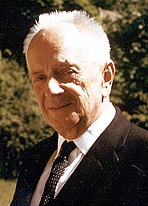Man, the Center of the Universe
Civilization has helped most of mankind to change from ignorance, undernourishment, and filth to education, at least relative abundance, and sanitation. That these changes are to the good is unquestionable. Yet, in the process of change man has also lost and failed to recapture some things of inestimable value.
Man no longer enjoys the certitude that he stands at the center of a universe created especially for his sake or the twin certitude that this universe is presided over by a Power that can be implored or propitiated and which cares for man, individually and collectively.
Copernicus and Galileo suddenly broke the news that the world does not revolve around man but man, instead, revolves around the world. And in this world, vast and merciless instead of snug and familiar, man is incidental and almost superfluous. The feeling of schism between man and nature was expressed with unsurpassed poignancy by Pascal (1623—1662):
When I consider the short duration of my life, swallowed up in the eternity before and after, the little space which I fill, and even can see, engulfed in the infinite immensity of spaces of which I am ignorant, and which know me not, I am frightened, and am astonished at being here rather than there; for there is no reason why here rather than there, why now rather than then. . . . The eternal silence of these infinite spaces frightens me.
Attempts have been made to relieve man’s alienation from the world he inhabits. Descartes thought that while animals were machines man possessed an immortal soul; Locke pointed out, however, that there is nothing in man’s mind that did not enter there via the sense organs.
Romantics revolted against the tyranny of mechanistic science, trusting the poet’s inspiration more than the scientist’s plodding toil; but it was physics, not poetry, that led to the industrial revolution, to the abundance of material goods, and eventually to the frightening power of atomic energy. Nothing succeeds like success, and the man in the street became convinced that material power is to be admired above intellectual power.
To many Darwin seemed to have delivered the heaviest blow, making the schism in man’s soul irreparable: far from the world having been made for man, man himself proved to be merely one of some two million biological species, a result of material processes of a rather unedifying sort, called struggle for existence and survival of the fittest, and a relative of creatures as disreputable as monkeys and apes. With Freud the depreciation of the human condition reached the lowest level. Freud mocked man’s pretensions to spirituality, by denying him not only spirituality but rationality as well.
The most important point in Darwin’s teachings was, strangely enough, overlooked. Man has not only evolved, he is evolving. This is a source of hope in the abyss of despair. In a way Darwin has healed the wound inflicted by Copernicus and Galileo. Man is not the center of the universe physically, but he may be the spiritual center. Man and man alone knows that the world evolves and that he evolves with it…
Teilhard de Chardin saw that the evolution of matter, the evolution of life, and the evolution of human beings are integral parts of a single and coherent history of the whole universe… He chose to designate the direction in which evolution is going as “The Point Omega.” This is
a harmonized collectivity of consciousnesses, equivalent to a kind of superconsciousness. The Earth is covering itself not merely by myriads of thinking units, but by s single continuum of thought, and finally forming a functionally singe Unit of Thought of planetary dimensions…
Such grand conceptions are patently undemonstrable by scientifically established facts. They transcend cumulative knowledge; it is sufficient that this one is not contradicted by this knowledge. To modern man, so forlorn and spiritually embattled in this vast and ostensibly meaningless universe, Teilhard de Chardin’s evolutionary idea comes as a ray of hope. It fits the requirements of our time. For
Man is not the centre of the universe as was naively believed in the past, but something much more beautiful—Man the ascending arrow of the great biological synthesis. Man is the last-born, the keenest, the most complex, the most subtle of the successive layers of life. This is nothing less than a fundamental vision. And I shall leave it at that.


